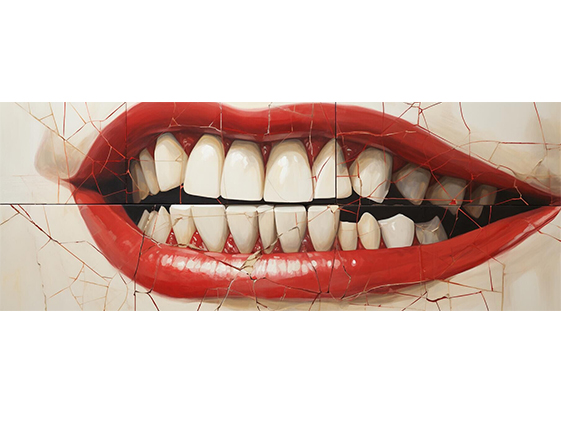Gum pain is a frequent dental problem that can cause anything from little discomfort to excruciating agony. To properly manage and relieve gum pain, you must be aware of the reasons, symptoms, and possible treatments. We shall examine several elements of gum pain in this blog and offer tips for getting relief. For additional details, just continue reading.
Reasons for Gum Pain:
- Gum Disease:
Gum disease, sometimes referred to as gingivitis or periodontitis, is the most typical cause of gum discomfort. Tenderness, swelling, and discomfort can result from gum inflammation and bacterial infection.
- Bad Oral Health:
Inadequate brushing and flossing can cause plaque and tartar to accumulate, which can irritate and hurt the gums.
3.Dental Diseases:
Localized pain and suffering might be brought on by gum-adjacent tooth decay or abscesses.
- Hormonal Alterations:
Gum discomfort can occur for certain people, mostly women, following hormonal changes like menopause or pregnancy. Increased blood flow and sensitivity during the procedure may account for the unpleasant sensation.
5.Canker Sores:
Studies show that more than half of the population suffers from canker sores. These are painful sores that affect the soft parts of the mouth, including the gums. They usually heal on their own in about a week. Sometimes mouth sores are associated with conditions such as Crohn’s disease or nutritional deficiencies, and they can also be triggered by certain foods or ingredients in toothpaste.
- Food Allergies:
Food allergies: Certain food allergies, like pollen fruit syndrome (PFS), or oral allergy syndrome (OAS), can occasionally result in painful gums. After consuming particular fruits and vegetables, the patients may have itchy and inflamed gums, mouths, tongues, and throats. Swollen gums may eventually become painful and irritated.
7.Chemotherapy:
Some medicine may lead to gum pain. Here is a list for reference:
Anticonvulsants: Dilantin (phenytoin);
Immunosuppressants: Cyclosporine, Prograf (tacrolimus);
Calcium-channel blockers: Used for high blood pressure and cardiovascular conditions, including Procardia XL (nifedipine), Cardizem (diltiazem), Verelan (verapamil), Norvasc (amlodipine);
Oral contraceptives ;
Antidepressants: Effexor XR (venlafaxine), Prozac (fluoxetine).
8.Tabacco Use:
Smoking, using smokeless tobacco products such as dip or marijuana/cannabis can weaken your immune system. These measures can lead to an increased likelihood of gum disease. Gums may also take longer to heal, and treatments for gum disease may not work.
Symptoms of Gum Pain:
1.Swollen and Red Gums:
Gum inflammation is a typical sign of gum discomfort. They may have a reddish colour and a bloated appearance.
- Unclean Breath:
Despite practicing basic dental hygiene, persistent foul breath may be a sign of gum disease and gum discomfort.
- Bleed Gums:
Gum bleeding frequently accompanies with pain, especially during brushing or flossing.
4.Recessive Gums:
The gums may recede as gum disease worsens, exposing the tooth roots and increasing sensitivity and discomfort.
Relief Measures for Gum Pain:
- Maintaining Good Oral Hygiene:
Brushing and flossing at least twice a day helps to eliminate germs and plaque, which lessens gum discomfort and inflammation.
2.Saltwater Rinse:
By lowering swelling and calming the gums, a warm saltwater rinse can offer momentary relief.
- Non-Prescription Painkillers:
Ibuprofen and other over-the-counter painkillers can assist with gum discomfort. But always get advice from a dentist or pharmacist first.
4.Avoid Irritants:
Avoid irritants like alcohol, smoke, and spicy meals since they can aggravate your gums and make the discomfort worse.
Professional Treatments for Gum Pain:
1.Professional Cleaning:
Scaling and root planing are two common dental cleaning procedures. They can eliminate plaque and tartar, ease gum discomfort and enhance gum health.
2.Antibacterial Treatment:
When gum diseases worsen, dentists may recommend antibiotics or antimicrobial mouthwash to get rid of germs and treat gum pain.
3.Dental Procedures:
Dental conditions including tooth decay or abscesses can occasionally be the source of gum discomfort. For pain treatment, you may require dental operations, including fillings, root canals, and extractions.
Prevention of Gum Pain:
- Good Habits:
Try to brush and floss correctly and frequently, and schedule regular dental exams. This can stop gum disease and the accompanying gum discomfort. Additionally, anti-gingivitis toothpaste and mouthwash are options. For improved cleansing, brush twice daily with an electric toothbrush to maintain oral health.
- Balanced Diet:
A diet high in nutrients and low in foods with sugar and acid will help a lot. This can maintain gum health and lower the risk of gum discomfort.
- Stress Management:
Stress can impair immunity and exacerbate gum issues. Use relaxation methods including exercise, meditation, or hobbies.
You should never disregard gum discomfort since it may indicate hidden dental problems. To maintain ideal gum health, it is essential to comprehend the causes, identify the symptoms, and take the proper steps for alleviation and treatment. Remember that maintaining good oral hygiene habits and receiving regular dental treatment can go a long way toward preventing gum disease and preserving your smile. Never hesitate to get in touch with us if you need assistance with dental items!

